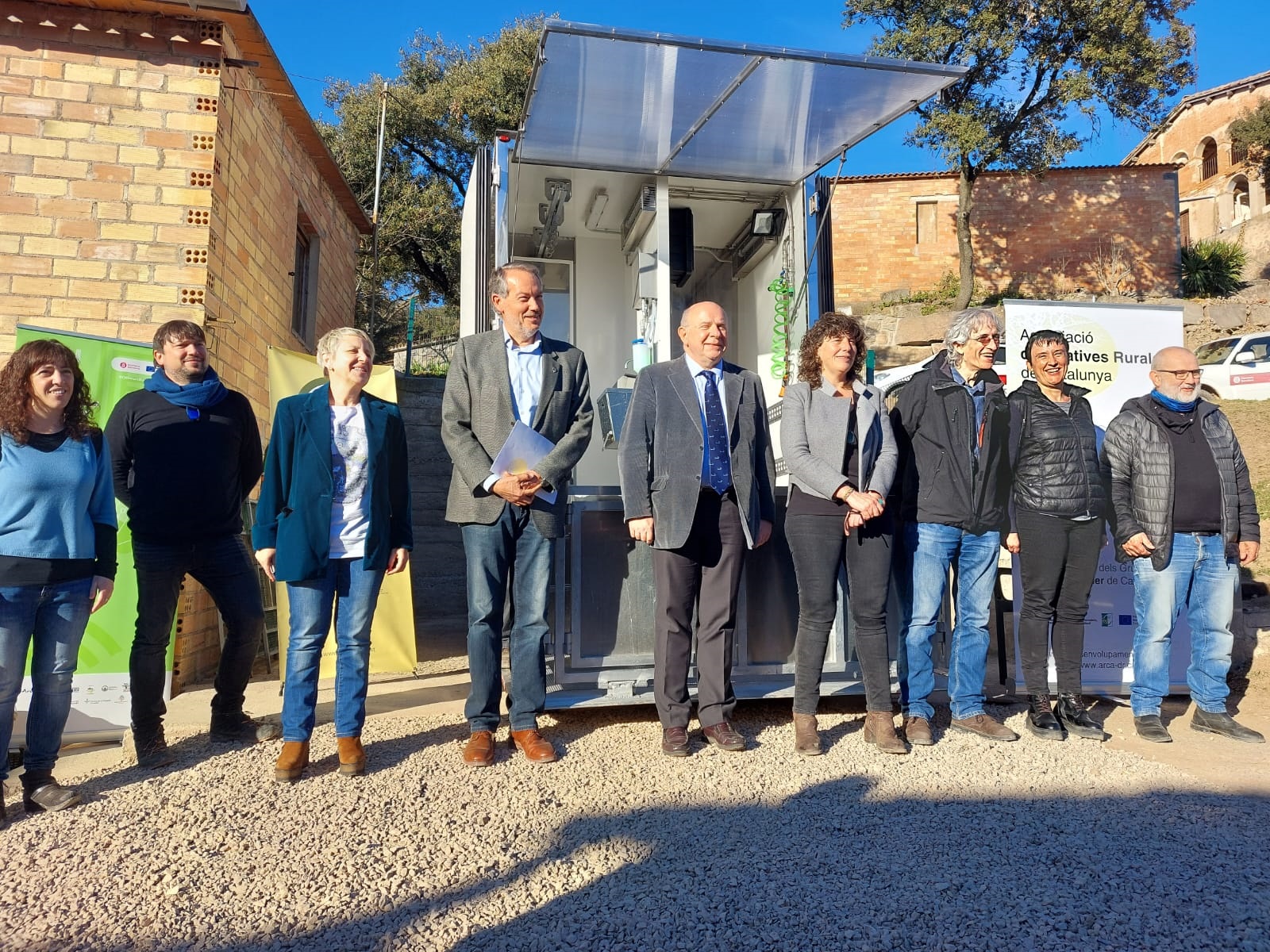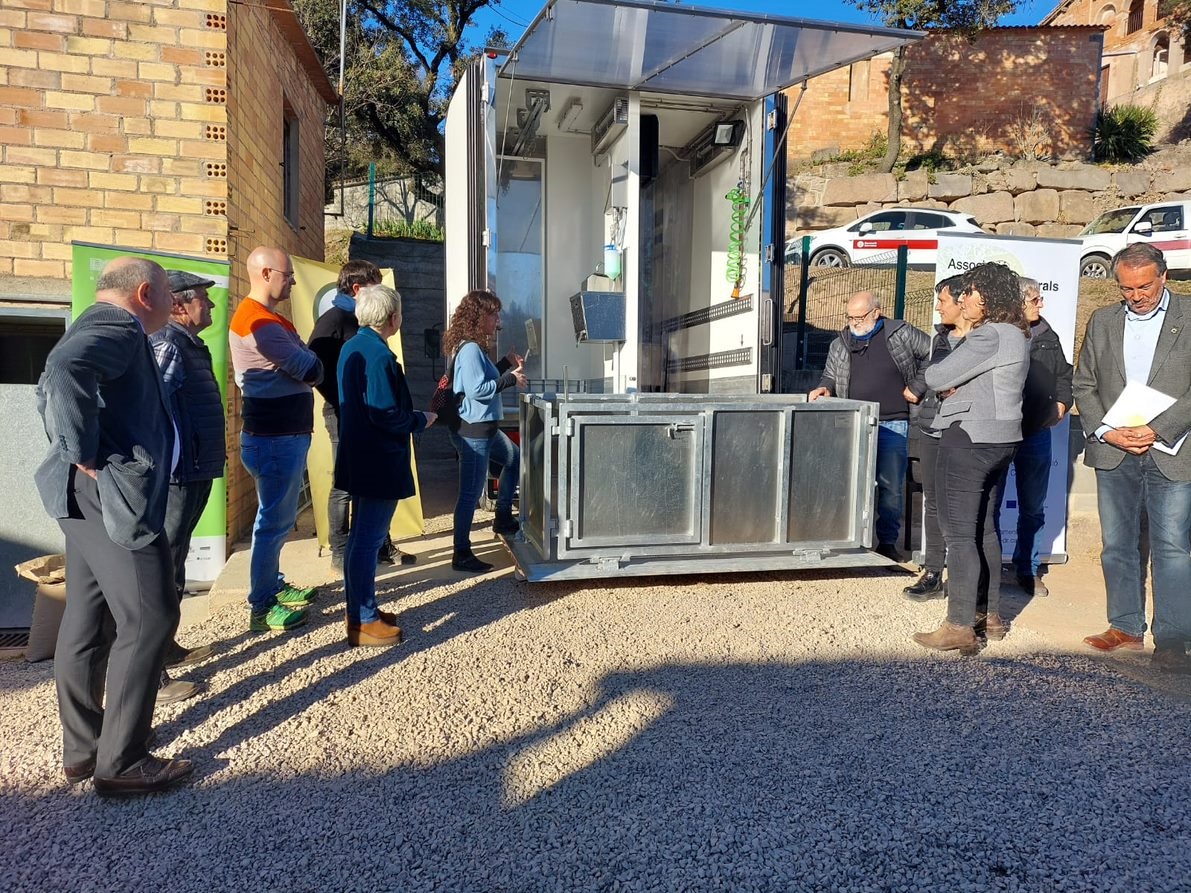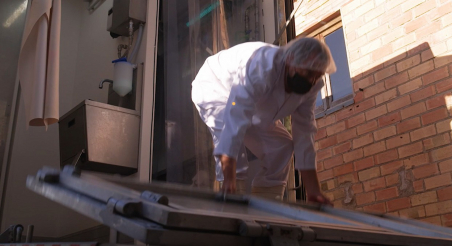On February 17th, Berguedà witnessed the official launch of Spain’s first mobile abattoir. Housed in a truck, this new facility will visit small sheep and goat farms in Bages, Berguedà, Moianès, and Osona, eliminating the need for shepherds and farmers to travel hundreds of kilometres to slaughter their animals. According to experts, reducing travel time significantly lowers animal stress, improves meat quality, and decreases transportation costs and environmental impact.
Currently, two farms have obtained the necessary authorisation to use the abattoir, but it is expected that around ten more will join soon as they meet regulatory requirements. To begin with, farmers wishing to use the truck must have a clean, paved, and enclosed area to prevent other animals from entering while work is underway. Additionally, the vehicle must be able to connect to water and electricity. All animals to be slaughtered must have individual traceability.
A unique facility
The Central Catalonia Abattoir cost €96,000, co-financed by the Diputació de Barcelona and the European Regional Development Fund (ERDF) as part of the BCN Smart Rural project. It has also received support from the Department of Climate Action, Food, and Rural Agenda, and the Department of Health, which helped identify and adapt regulatory requirements to suit the size of the farms, facilitating work for both small farmers and the abattoir operator. The Rural Initiatives Association of Catalonia (ARCA) was the primary promoter of this pioneering facility in Catalonia and Spain.
To ensure the proper operation of the abattoir, the entire slaughter and butchery process was carefully studied, and the truck had to be completely redesigned. The vehicle now features separate clean and dirty areas and a refrigeration chamber to store carcasses until they are dispatched through a side door. Outside the abattoir, there is a lifting platform and several metal pens for holding four to five animals, depending on their size.
The new service addresses a longstanding demand from small farmers in Barcelona province, who, due to the gradual closure of small municipal abattoirs, have found it increasingly difficult to find nearby slaughter facilities that accept their livestock, rather than only working with large agribusinesses.
Institutional collaboration, key to the success of the project
The Minister of Climate Action, Food, and Rural Agenda presided over the official launch of the abattoir, linking it to a “firm commitment to the sustainability of the territory.” Teresa Jordà emphasised that “through administration and in conjunction with other stakeholders, we must ensure the viability and competitiveness of the livestock sector, given its significance for territorial cohesion and the sustainability of our country.” In this regard, the minister highlighted the importance of supporting extensive livestock farming and local products, and announced that the abattoir inaugurated yesterday “is just the first of many to come.”
ARCA President Francesc Lluch highlighted the uniqueness of the abattoir, describing it as “a project unique to Catalonia and Spain.” He expressed great satisfaction at seeing the facility in operation and expressed a commitment to continuing support for small agro-food producers in the region with “small dairies and shared workshops. We must fight to ensure that the market has local and quality products.”
Ramon Bach, Technical Secretary of the National Association of Breeders of Ripollesa Sheep and one of the promoters of the abattoir, noted that the new facility “will help keep people in the territory and stop the closure of sheep farms, a very ageing sector. We must work to ensure our farms are viable and that generational renewal is possible.” Bach pointed to direct sales of meat from their own farms as a key measure to revalue the products of small livestock farms.
Finally, the Coordinator of Natural Spaces at the Diputació de Barcelona stressed the importance of the primary sector in preserving the landscape. According to Jordi Padrós, “Agricultural landscapes are a gift that we must value and enrich, as they help us prevent forest fires and keep people in the territory.”
A strong commitment to local food
The Central Catalonia Abattoir is managed by the Rural Initiatives Association of Catalonia and is part of the PECT BCN Smart Rural, a rural development programme co-financed by the Diputació de Barcelona and the European Fund. Its objectives include creating innovative, multi-use facilities that support small producers and agro-food artisans in the region.
In this sense, the abattoir is just one of five shared food transformation spaces being developed by the Diputació de Barcelona as part of this European project. The other four facilities are the Lluçanès dairy, the Bages vegetable processing workshop, the Montserrat Rural Park butchery, and the Moianès modular abattoir. Some are already operational, and others will be soon.
For more details about the new facility, clic here.
About BCN Smart Rural
BCN Smart Rural is the Barcelona Provincia Council’s strategy to promote the sustainability of the region’s agro-food sector. Co-financed by the European Union through the European Regional Development Fund (ERDF), this joint initiative is at the forefront of actions promoted by both institutions with a 2030 horizon, both agricultural and food-related, and aligns particularly with the “From Farm to Fork” campaign, which is at the heart of the European Green Deal.
BCN Smart Rural’s vision is to place the right to healthy, sustainable, and local food at the centre of the region’s political agenda. To achieve this, it collaborates with interested municipalities to promote this agro-food model in their towns and cities.
For more information about the BCN Smart Rural strategy, please contact bcnsmartrural@diba.cat .
— BCN Smart Rural Editorial —




